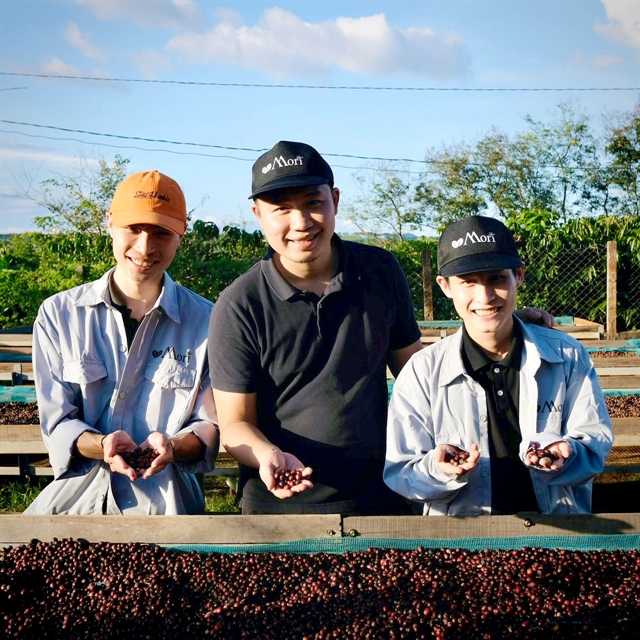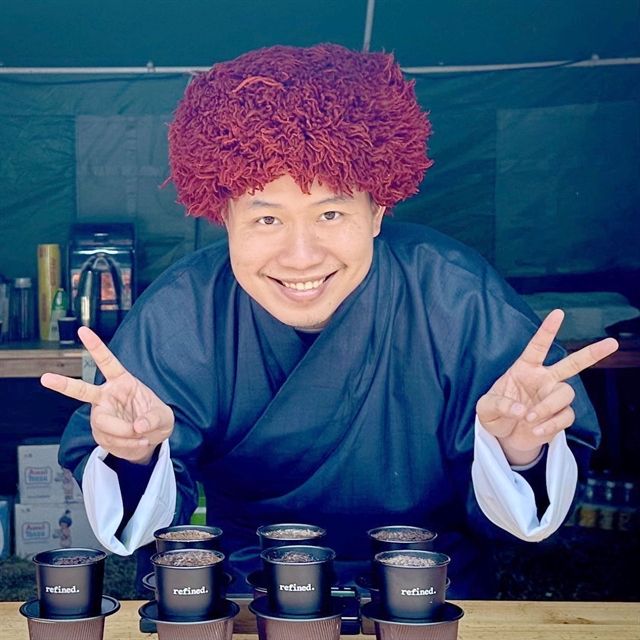Vũ Đình Tú, is the owner of the Refined. coffee company and an expert who specialises in the Vietnamese Fine Robusta and "Phin" filter technique. Having only learned how to roast coffee for three months, he placed third in the Vietnam Open Roastmasters Championship 2021. Trần Khánh An interviews him about his journey and where Vietnamese coffee culture is on the world map.

PIONEER: Vũ Đình Tú (centre) has two prestigious international qualifications for a person working in the coffee industry - the Arabica & Robusta Q-Grader. Photo courtesy of Vũ Đình Tú.
Inner Sanctum: Having left a nine-to-five job, you decided to pursue a career as a coffee specialist. What was the turning point?
Truly speaking, the turning point was COVID-19. As a coffeeholic, at first, I only learned how to roast coffee as a hobby during the pandemic. The eye-opening experience was when I discovered Fine Robusta, which is Robusta coffee graded to the "Fine" threshold.
To be classified as a Fine Grade, Robusta coffee beans must be graded by Robusta Q-graders. The process of grading green and roasted coffee beans through cupping must follow scoring criteria and quality assessment regulated by the Specialty Coffee Association and the Coffee Quality Institute.
Having discovered the unexpectedly delicious taste and potential of Fine Robusta, I went to various coffee farms in the Central Highlands to experiment with different roasting profiles. I want to take forward our traditional typical method of brewing coffee: the Phin filter ["Phin" is a Vietnamese word, short for filter].
The journey of Refined. started in my bedroom with a roaster I borrowed from a friend, and so far, I have three coffee shops mainly serving Fine Robusta in Hà Nội.
Inner Sanctum: Where do you think Vietnamese Robusta is on the world coffee map? What is the potential of this type of coffee?
Vietnamese Robusta is just beginning its journey.
Việt Nam is the world's leading producer of Robusta, and the Robusta plant is more tolerant of climate change than Arabica. Robusta coffee has been deeply embedded in Vietnamese daily life for centuries, evolving into the essence of our coffee culture.
However, Vietnamese Robusta quality remains low, with the majority used as a raw material in instant coffee. Three common prejudices against Vietnamese Robusta are that Robusta is blended with additives; it is dark and oily with a bitter flavour; and it is low-quality and cheap compared to Arabica.
Robusta beans are not all poor quality, but due to improper variety selection, cultivation, and processing at farms, as well as coffee roasting defects, Vietnamese Robusta is underestimated and has not reached its full potential.
Inner Sanctum: How can we redefine Vietnamese Robusta? What do you predict will be the changes in Việt Nam's coffee industry?
The biggest challenge the country's coffee industry faces is how to enhance Robusta quality from coffee farms, which need to follow international criteria and quality control. When Robusta coffee is carefully fertilised, harvested, roasted and brewed with the best profile, it is delicious. By adjusting and applying the latest world-class techniques from Arabica coffee, we can elevate our Fine Robusta and Phin coffee to a new level.
I strongly believe in Fine Robusta and Phin, two hidden gems of Vietnamese coffee culture. Because of this, the name of my coffee shop is Refined. instead of ‘re-defined'. The beauty of Robusta is still present, and our work is to reveal its value to the world.
Coffee is a big world that takes time to conquer. When Vietnamese Fine Robusta becomes more well-known, foreigners and even the Vietnamese older generation only familiar with commercial-grade Robusta, will engage more with Fine Robusta.

OLD-SCHOOL WAY: Having realised the convenience and low cost of a typical Vietnamese brewing tool compared to a heavy coffee machine, Tú brought 50 Phin filters to Bhutan for his trainees.
Inner Sanctum: After you wrote a letter to the King of Bhutan in December 2022, you received an invitation to join the De-suung Skilling Programme as an expert trainer. Can you tell us about this?
The King of Bhutan launched a programme called "De-suung", which means "Guardians of Peace". Bhutan’s young people join De-suung to work in social service, in exchange for receiving a wide range of short-term skill-building courses to improve their capacity to engage in economic opportunities.
During one month as a coffee expert trainer, I provided Bhutanese trainees with three things: an overview of coffee and skills in brewing; creative drinks using local ingredients; and ideas and operations for running a coffee business.
My favourite creative beverage came from a female trainee who mixed coffee and carrot and utilised the carrot’s skin as a cup.
Bhutanese trainees still update me with their incredible news. Some of them earn a living by selling coffee with Vietnamese Phin filters. Recently, one trainee received much positive feedback from foreign tourists.
I am delighted because my journey has made an impact, even if only on a small number of people.
Inner Sanctum: What are your future plans?
To utilise and promote Vietnamese produce, I have integrated Robusta with our specialty foods. Recently, I have created heat-relieving drinks combining coffee with apricot or dracontomelon. After I put them on Refined.’s menu, customers, even foreign tourists, were astonished and gave great positive feedback.
Aiming to help people professionally develop the coffee sector, I try my best to define a career path and provide a decent salary for my team to fully commit to their job. The career of a barista should be more than a temporary job for students. For me, being a barista is a challenging job, it requires care, diligence, and resilience. — VNS
OVietnam